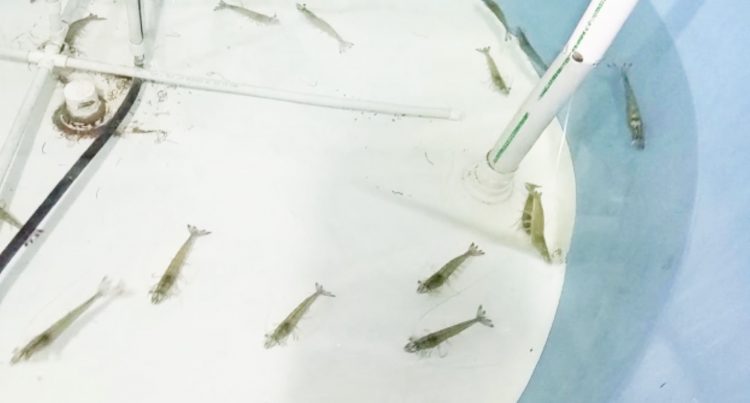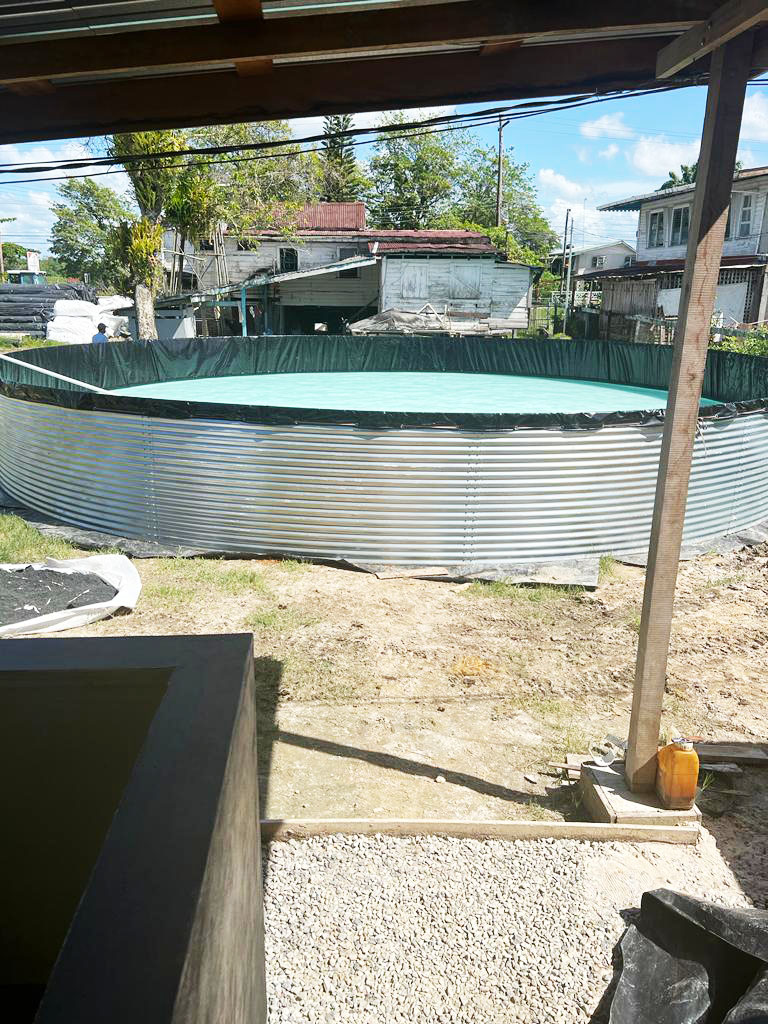Now bouncing back from a major disruption in operations, the developers of Hubu Aquafarms said they are determined to see the project prosper.
“We had, shall I say, an ambitious schedule and we missed our target and it was disappointing, but we haven’t given up and there’s no question of giving up,” Director Simon Shaw told this publication.
He disclosed that the first batch of larvae died, setting the project some nine months behind schedule. The first batch of larvae was imported from the United States in October. The aquafarm was expecting to harvest fully grown prawns by December but that objective failed after the larvae died. Shaw noted that while the disruption put the company in a tight financial position, they gained valuable experience that will improve their management of the farm.

“We had a problem with the quality of the salt we bought – salt from Brazil. It was supposed to be pure sea salt but it turned out it wasn’t, it was industrial salt, so that definitely killed the first batch,” he explained. A second shipment of larvae is expected to arrive in Guyana soon to improve their production.
As the company repositions itself, the director predicted that they should soon be able to produce home grown larvae and fully grown prawns. He noted that they should have been able to start production of larvae already but they discovered that the females were not getting enough fat in their yolk sacs for the nauplius. The nauplii need to feed on the fat to grow into the next stage of the life cycle.
The company, he informed, purchased paraphyletic worms from Holland to combat the issue. The worms store fat during the winter period and aid in the maturation phase for the shrimp broodstock. “..We brought those in like two weeks ago and now the shrimps are in good health. We have lots of eggs,” he stated.
Shaw commented further that the inclement weather conditions have not been kind to them. This has resulted in land preparation at Hubu being stalled. The rain made it difficult for them to install the plastic lining inside the ponds.
“On the farm, we have not had much of a dry season at all. We are really hoping El Nino will give us some good weather,” he said. Asked if they were prepared to accelerate production, given their position and confidence in the project, Shaw responded in the affirmative. However, he said, the only problem was “we are short of money.” He added that they are currently seeking external partners to assist them as the local banks are not keen on extending their line of credit.
“We have had a setback but we have been paying wages and getting more products to bring the project to production but the bank is not willing to give us more. They said we have used up our finances and they are not helping. We are in a tight financial situation.”
However, with this project and the use of organic harvesting, the operators hope to eventually net 30 percent of the UK’s prawns market.
Moreover, the director disclosed that they are expanding their research and development centre with two interns currently working at the hatchery and laboratory. The interns, Peter van Nes and Amée van Haeften, are conducting research. The former’s research is analysis of the farm’s carbon footprint while van Haeften is looking at waste reuse (biofilm from prawn shells).
In addition, the aquafarm will be installing 45, 40-ft, above-ground ponds to engage in single sex cultivation and research and development. The director explained that they will also conduct trials on different varieties of prawns. The centre will also support future farms and will give an idea on how they should function.
Barbados partnership
Providing an update on the Barbados leg of the project, Shaw disclosed that larvae have already arrived on the island and are acclimatising to the conditions. The brood stock is deemed to be healthy and he has been able to remotely monitor their progress. The company is working with Barbados Agricultural Development and Marketing Corporation, through the Guyana/Barbados food terminal agreement, in assisting the island with setting up a small-scale aqua farm.
“It’s an agreement between the two governments and we were just asked to help them. So we’re going to supply larvae to Barbados, hopefully we’ll supply them the feed, and we’ll supply one of our Indonesian guys to go and get it started. But what they’re doing in Barbados is much, much smaller,” Shaw had previously stated.
In a previous interview, it was reported that the company has some 600 acres to execute its vision, but was commencing operations on 10 acres of land. At the hatchery, Shaw explained, they will not only breed larvae for their own use but to retail to other farmers who wish to enter the market.
They will also grow their own plankton and algae to feed the larvae. The breeding conditions at the hatchery are being closely monitored and controlled to ensure ph levels are on par with industry standards. The company will rear different breeds of prawns and shrimp, such as Giant River prawns, White Leg shrimp and Asian Tiger prawns.
Shaw explained that while it is the company’s vision to become a major exporter to Europe and compete with producers from countries in the Caribbean and South America, the first harvest will be supplied to the local market.






